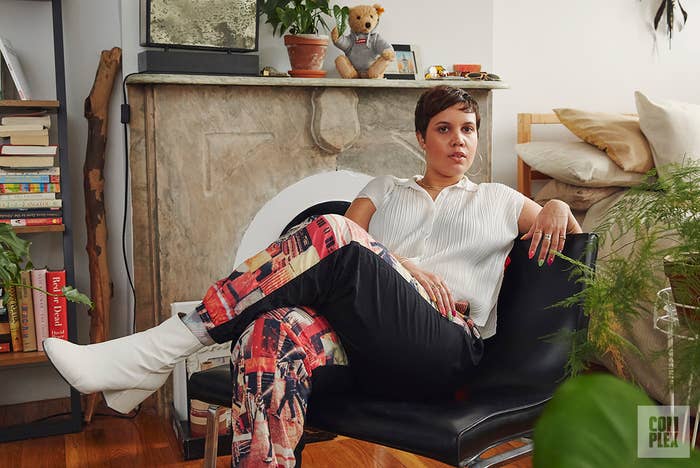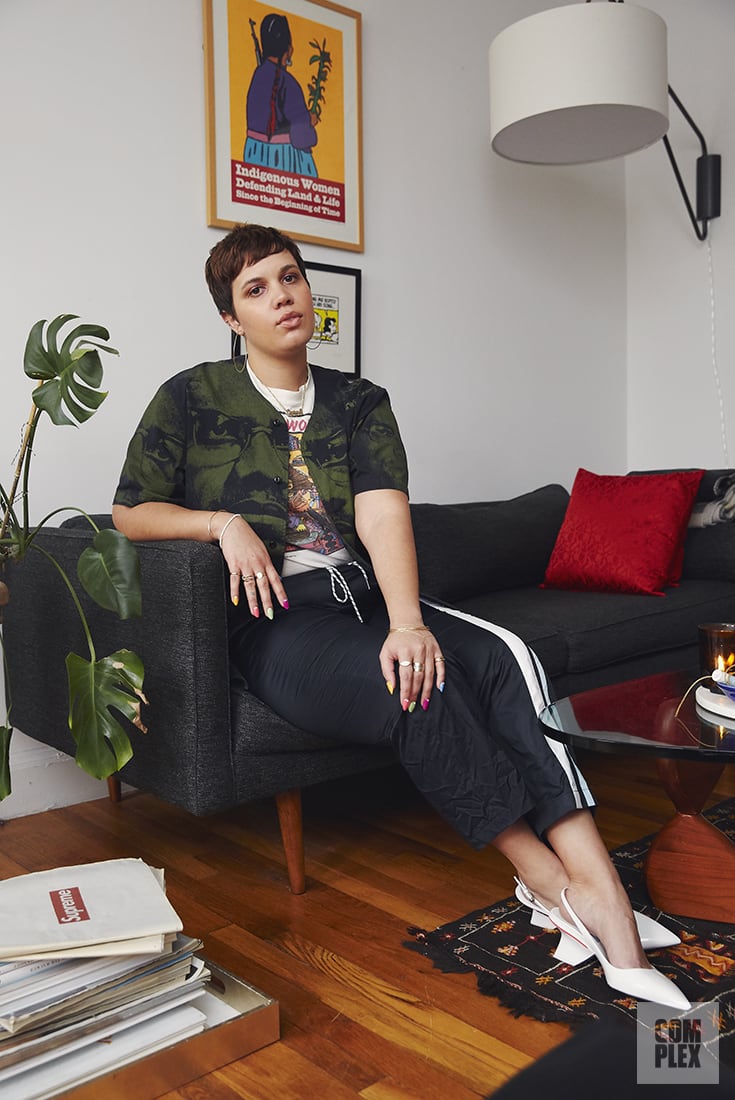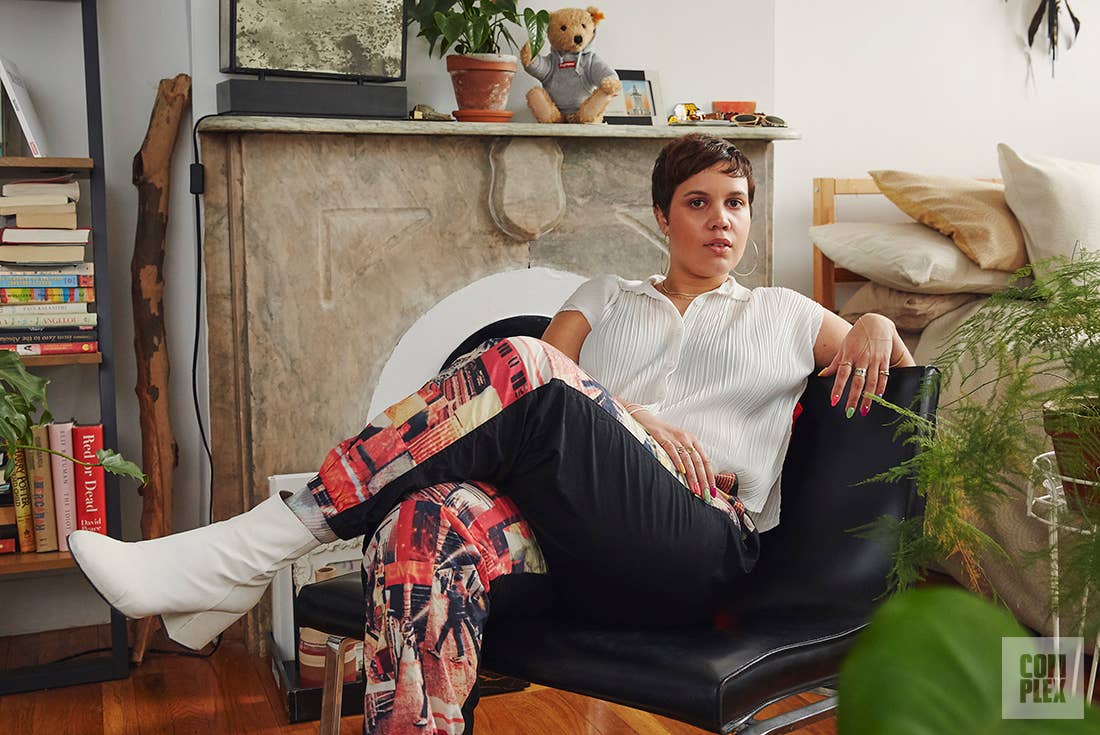
There's a person responsible for making that Supreme air horn you stood in line for, or the brick you found ridiculous but needed to have in your collection. Amaya Keller, Supreme's production manager for headwear and accessories, is that person, and her Brooklyn studio is casually dotted with Supreme paraphernalia ranging from the Steiff teddy bear to the New York Post edition that she helped actualize. She calls them her babies.
Keller, who was raised in a biracial family in Oakland—her father was a Black Panther and her mother was an activist—isn't actually building these pieces with her own hands, but she's ensuring that the valuable items get made by the companies that produce them. Here, Keller talks about how she got her job at Supreme, what it's like working there, and advice for anyone wanting to break into the fashion industry.
How did you get into fashion?
I went to school in Paris for my freshman year of college and then I moved to New York and studied at the New School. My goal essentially was to study the way that fashion affected racial perceptions because I don't have a clear indicator of my race. But I was trying to be a stylist. That kind of wasn't really working. I interned at Live with Regis and Kelly. I interned at the Irene Albright Fashion Library. I was just trying to find my bearings.
How did that lead to your job at Supreme?
My ex-boyfriend grew up with Natalie and Nicole [Albino] of Nina Sky. Nicole is Erin [Magee's] wife, so I told him to connect me because I wanted to work for MadeMe.
I have gotten into some altercations with people who didn't know I worked there. Some dude who was like, 'Supreme is so stupid. They just put their logo on everything.' That criticism is really tough, because it is fundamentally so untrue. If you were a fly on the wall in our office, you would realize so quickly how not lazy everything is.
What drew you to MadeMe?
I don't even remember. I think I was following Erin on Twitter. I have an old T-shirt of hers that I bought, and I just liked the brand. I also knew that in this industry it was important to know someone. And the environments that I was working in didn't fully feel me. I'm not super high fashion. I'm not watching shows all the time. I'm not paying attention to that world. The world that I'm a part of is this downtown culture. That's the world that I wanted to be more a part of. I watch what people are wearing on the streets. And so I met with Erin, and I'll never forget. We got food from Duke's and we sat on the steps on Mercer Street, and I was like, "I will work for you for free. I will do whatever you want me to do. I will run your blog. I will be a stylist." And she was like, "You don't want to be a stylist. You will be a pack mule for the rest of your life." But I started running her blog, and I would help her on shoots. Eventually she asked me if I was interested in working for Supreme.
What was your understanding of the brand at that point? Were you interested?
I was. I wasn't super fluent. I knew what the brand was. I knew that kids were lining up. I remember wanting this camo jacket from them before I started working there and I went to the store and there was a line and I was like, 'My God. I'm not waiting in line to get into this store.' But at the time I was working for Apple, but I knew I needed a full-time job to stay in New York.
Did you immediately get the job? What was the position?
No. I interviewed at Supreme and I wasn't hired. I was legit across the street from the store on Lafayette and I was bawling. It interviewed for a shipping and logistics manager position. Erin wrote me and said we are growing a lot and I'm sure we will find space for you, but you just don't have enough experience. But things didn't work out with the girl they hired, so they brought me on for a trial run. I started on January 4, 2012, and I haven't left since.
What does a shipping and logistics manager do?
My job then was to literally ship every single thing for the brand. I shipped all of the fabric from the fabric mills to all of the factories and all of the bulk goods from the factories to every store. I did the label production on everything. I also was in charge of organizing all of the samples to be photographed. All of our web photography. And I think that was it. It was essentially what you call a sample room manager and shipping and logistics manager and a label manager.
Did you enjoy these jobs?
I hated being the shipping manager. I was so bad at it. The first six months were incredibly challenging. I think the first six months at Supreme can be really challenging, but it worked out. I got into the flow and I knew that if I didn't stay there, there was nowhere else to go. And I wanted to work somewhere that was impressive. That was important to me, and Supreme checked that box. It took a long time for me to come into being OK with that being my truth, because I feel like people act like you aren't supposed to care, but I care.

How long were you in that position?
I stopped doing shipping pretty quickly because Erin could see that my brain wasn't suited for it. I spent a year doing that, and then I got into my current position as production manager for accessories and headwear. I've had the same title since I stopped doing shipping; it's just that what I do has grown so much because the brand has grown so much over the last six years.
Did you expect the brand to get this big?
I don't think I ever thought about it. I certainly wanted the brand to continue its success, but I never had a moment where I thought about where we would go. I just continued working and hoping for the best.
What is your day-to-day like?
What I always tell people is that I get a piece of paper from the designer and I bring back a product. Sometimes they don't even give me a tech pack. They just ask me if we can produce what they've designed. I then communicate with the different factories and we try to push the boundaries a lot in my categories. Really, what my job is is emailing and staying on top of things. That's what a production person does. I make sure the price is right, the time is right, and we are getting the quality that we want.
What is the timeline for that, usually?
It depends on what it is. The hats at Supreme are a lot about fabric, so there is a lot of development that goes into that, so I work pretty closely with the fabric manager in our office, who sources all of that. And then, for the accessories, it depends on what it is. Sometimes I'm making a pinball machine, sometimes I'm making a teddy bear, sometimes I'm making tennis balls, sometimes I'm making an apple. I make all of those things. That's my bread and butter. That's what I feel like has been why I've grown to really love my job, because it's something different every time. It's constantly a new challenge.
What's been the biggest challenge?
I really don't know. There are things that are challenging for different reasons. Some things are challenging because we want something for a price that we can't get it for. Some things are challenging because logistically they are really complicated. Some things are challenging because they just have never been done before. When I think back on the hard times at work, it's not because of production. The challenge of production is figuring out when you can trust something and when you can't. And knowing how to instruct someone who is sitting in a factory or someone who is an agent or someone who is making the product. It's about taking their noes and turning them into yeses.
Does it make it harder when a third party is involved?
Sometimes. But sometimes it's easier. It depends on who the third party is. But at the end of the day, most of the people who we work with have the same goal that we do.
You are so close to the product and how much it costs to produce. What do you think about the Supreme resale market?
I'm not aware or fluent in it. I am not paying attention to that aspect of the culture. It's not something that I am really participating in.
How would you describe the work environment?
We work really hard. That's how I would describe it. We really work our asses off. Just as hard as you would imagine a company like ours works, we work. Probably harder. But at the same time we have a lot of fun. And it's cheesy, but we are a really big family. We are just good people who are trying to do cool shit. We care about the youth. We want them to buy our shit because they like it. It's not rocket science, really. It's fun. It's not the most buttoned-up office, but we are working our asses off.
Do you pay attention to Supreme criticism?
I would say a solid 98 percent of the time, I'm like, whatever. I don't really pay attention because I don't really care. But some of it is interesting. I think some of it is funny. I will laugh along with memes the same way everyone else does. I have gotten into some altercations with people who didn't know I worked there. Some dude who was like, "Supreme is so stupid. They just put their logo on everything." That criticism is really tough, because it is fundamentally so untrue. If you were a fly on the wall in our office, you would realize so quickly how not lazy everything is.
There is no greater fear I have than when I am in head-to-toe Supreme and I see people who are also in head-to-toe Supreme. I have an unreasonable reaction, like somehow they will know who I am.
What do you feel about hype around the brand?
I just don't pay attention to it.
How do you not?
Obviously I see it with my eyes. There is no greater fear I have than when I am in head-to-toe Supreme and I see people who are also in head-to-toe Supreme. I have an unreasonable reaction, like somehow they will know who I am. I hate when strangers ask me for things. I just try not to tell people where I work. When I was dating, I definitely didn't say anything. I don't want a dude to try to court me because of where I work.
How do you think you've impacted the company?
I don't know. Have I? Obviously if you look at the categories that I manage, that's my work. But we have our leader, who is James [Jebbia], and yet we are very democratic. No one person could take ownership over one single thing. We are a team. There are conversations that happen when we are working on things that have to do with the culture that I'm a part of, but it's not like I'm a point person for that, which is really good.
What do you think is the disconnect with women's streetwear?
I just don't think enough women are starting brands like that. And it's also something we don't really need. We need our own brands because we need our own brands. That statement is true, but because men's streetwear is now essentially unisex, it's kind of like, why put the work in? Every girl I know who is even remotely interested or adjacent to this culture is totally interested in men's clothes. So there is this weird nuance. Obviously I love what Erin does with MadeMe, and I think she's been a very constant force in that world, but other than that, I mean it's really hard to even think of like what other women's streetwear brands are.
Do you still consider Supreme streetwear?
I would say we have streetwear elements, but I believe we are a fashion brand at this point. We make clothing for a 60-year-old gallery owner. We make clothes for a 14-year-old boy. We make clothes for a 30-year-old woman who wants to go out on Saturday night, but I don't know what the limits of streetwear are. The word streetwear is also so stupid. Is it clothes you wear outside? It doesn't make any sense.
What do you think about how luxury has embraced streetwear?
First of all, it's sick that Virgil is doing that job. Hands down. No doubt. But I'm also just so curious because his last menswear collection was not as street-based. I think it's kind of funny, honestly. Some of the stuff other brands do does feel appropriation-y at times. It's always been kind of weird to see people who I don't associate with visually wearing that type of clothing. It would be like if I lived on a cow ranch and wore cowboy boots and fringe jackets and that was on the runway. That would be funny to me also because that's who I am. But that's just fashion.
Do you think it will last?
No. I think that the style is already moving away from that. It will linger and trickle down for the next three to four years, but I think luxury is always going to try to appeal to what they think is cool right now. This aesthetic has been a part of my canon for longer than luxury has paid attention to it and before anyone in any luxury office was talking about Supreme. And I will still be dressing that way when they are not talking about it. So that's why it's funny to me, because it's my actual culture. I saw a pair of terry cloth cargo pants in the window at Louis Vuitton's Paris store and I really laughed.
Is there a way for luxury brands to adopt the culture in a way that doesn't feel wrong?
I don't think so. I think that's what they do. Someone like me is always going to laugh, but a lot of people aren't laughing—they just buy the shit. So I'm going to laugh at it, yes, because I'm in this industry. But If I were a film producer, I might be wearing those terry cloth cargo pants.
What advice would you give young people entering the industry?
Be down to do anything—really at any age, but especially when you are young. Be vocal. Closed mouths do not get fed. You have to ask for what you want, especially as a woman. Don't let someone tell you what you're doing unless you agree with that. And listen to older people. We know things because we've been through it. And this is more challenging, but if you can find an older woman that you trust, seek that out. Erin has been tremendous in my career. And don't be afraid to say what you don't know. And research. This whole facet of the industry is barely spoken about. It's a privilege, obviously, to be able to work for free, but if you want to make it in New York, you have to work for free for a little bit. It is a truth. We've all done it. Have another job. Don't work for free all the time, but I think you know, you have to hustle to get what you want.

